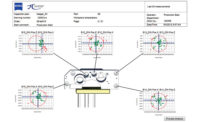CONGRESS STEPS UP TO PLATE
America's small manufacturers are getting closer to keeping the public-private program that helps them remain globally competitive. Before its recess in August, the Senate Appropriations Committee recommended $106.6 million for the Manufacturing Extension Partnership (MEP) program in the Department of Commerce's fiscal year 2003 budget. Sen. Ernest Hollings, D-SC, is the chairman of the Senate Commerce, Justice and State Subcommittee, which made the funding request to the full Appropriations Committee. "Small manufacturers produce 55% of the value of our country's manufactured goods -- an incredible contribution to the health of the manufacturing sector and the economy as a whole. We should be doing everything in our power to ensure that small manufacturers have the tools they need to increase their productivity, and this country's MEP centers play a vital role in that equation," says Hollings. The Bush administration requested only $12.9 million for MEP in its fiscal year 2003 budget, citing the need to channel more funding to defense and homeland security programs. MEP is currently funded at $106.5 million. Hollings says, "This is no longer just about economic recovery. While we focus on the war on terrorism, we must remember that our small manufacturers produce a lot of the parts and products that our military needs. It's in our best interest -- both economically and militarily -- to make sure that our small manufacturers remain competitive." The MEP is a national network of centers with 400 offices across the country and Puerto Rico that provides technical assistance and business support services to American manufacturers. The MEP helps small- and medium-sized manufacturers adopt new technologies, processes and business practices. In a separate matter, the House of Representatives approved a $47-million, four-year program that aims to create common standards for manufacturing software. The Enterprise Integration Act authorizes the National Institute of Standards and Technology to work with manufacturing industries to support the development of standards for information exchange and use these standards to ensure the seamless flow of information up and down the supply chain. Rep. James Barcia, D-MI, says, "The Enterprise Integration Act of 2002 will lead to dramatically shortened design cycle times and reduce the costs of manufacturing complex products. Information on design flaws will be instantly transmitted from repair shops to manufacturers and their supply chains. Companies will be able to exchange information of all types with their suppliers at the speed of light." The bill is now in the Senate for consideration.


